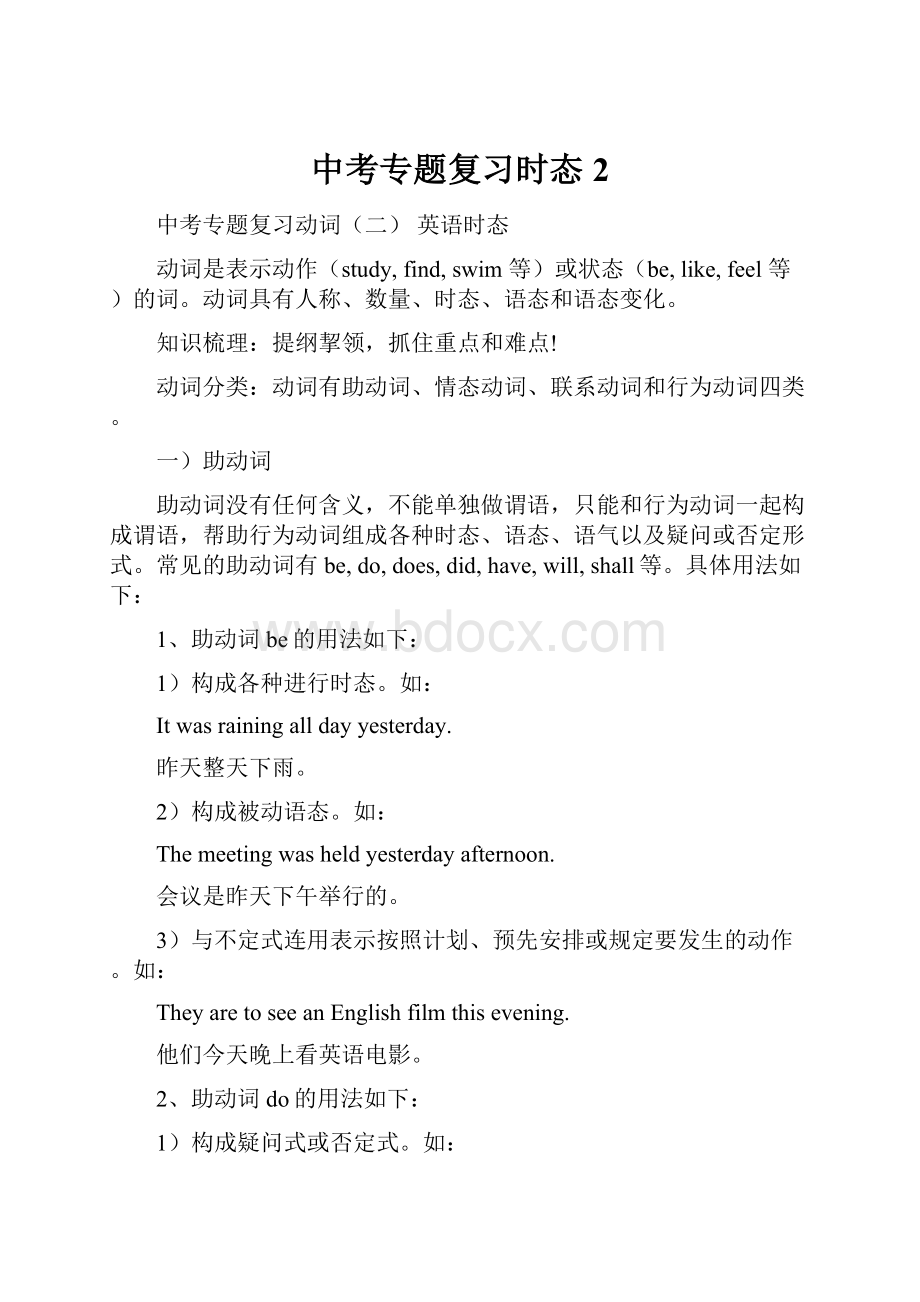中考专题复习时态2.docx
《中考专题复习时态2.docx》由会员分享,可在线阅读,更多相关《中考专题复习时态2.docx(17页珍藏版)》请在冰豆网上搜索。

中考专题复习时态2
中考专题复习动词
(二)英语时态
动词是表示动作(study,find,swim等)或状态(be,like,feel等)的词。
动词具有人称、数量、时态、语态和语态变化。
知识梳理:
提纲挈领,抓住重点和难点!
动词分类:
动词有助动词、情态动词、联系动词和行为动词四类。
一)助动词
助动词没有任何含义,不能单独做谓语,只能和行为动词一起构成谓语,帮助行为动词组成各种时态、语态、语气以及疑问或否定形式。
常见的助动词有be,do,does,did,have,will,shall等。
具体用法如下:
1、助动词be的用法如下:
1)构成各种进行时态。
如:
Itwasrainingalldayyesterday.
昨天整天下雨。
2)构成被动语态。
如:
Themeetingwasheldyesterdayafternoon.
会议是昨天下午举行的。
3)与不定式连用表示按照计划、预先安排或规定要发生的动作。
如:
TheyaretoseeanEnglishfilmthisevening.
他们今天晚上看英语电影。
2、助动词do的用法如下:
1)构成疑问式或否定式。
如:
Doeshethinkso?
Ididn’tsayanythingabouttheresult.
2)在动词前加上do,does,did表示强调,意为“的确,确实”。
如:
Theydostudyhard.
Shedoeslovehim.
Hedidwanttohelptheoldman.
3、have:
助动词have的过去式是had。
have和had均可与动词过去分词一起构成完成时态。
如:
Hehaslivedhereforthreeyears.
Assoonasthesunhadsettheyreturned.
4、shall,should:
助动词shall只用于第一人称的将来时态;助动词should是shall的过去式,构成过去将来时。
如:
Ishallsendtenletterstomygoodfriend.
ShewantedtoknowifIshouldgotothepalace.
二)情态动词
三)连词动词的种类
联系动词含有一定意义,它们要与其后做表语的形容词、名词或介词(短语)一起构成合成谓语。
系动词按意义可分为三类,而且有自己的特定用法。
1、按意义联系动词有:
be,appear,seem,keep,remain,continue,stay,prove等,如:
Jimappearsveryold.
2、表示感觉的联系动词有look,feel,smell,sound,taste等。
如:
Itsmellsbad.
3、表示转变的联系动词有become,fall,get,go,grow,turn等。
如:
Shebecomesmorebeautifulthanthreeyearsago.
四)行为动词
行为动词又称实义动词,它们都含有实在的意义,表示动作或状态,可在句中独立作谓语。
行为动词又分为及物动词和不及物动词。
1、及物动词
及物动词后一定要跟宾语,意思才能完整。
如:
Mymothertoldmeshewantedtobuysomebooksforme.
2、不及物动词
不及物动词意义完整,不需带宾语,但如果有些不及物动词非要带宾语时,必须先加介词后加宾语。
如:
Heonlyworriedabouthisdaughter.
二、动词的时态
动词的时态有很多。
初中阶段主要掌握八种:
一般现在时、一般过去时、现在进行时、过去进行时、一般将来时、过去将来时、现在完成时、过去完成时。
1.一般现在时
1)一般现在时态的构成:
主语是I,we,you,they和名词复数时作谓语的行为动词用原形。
主语是he,she,it和名词单数时,作谓语的行为动词的词尾变化如下:
一般情况
+s
以s,x,ch,sh 或 o结尾
+es
以辅音+y结尾
去y变i+es
2)一般现在时态的肯定句、否定句和疑问句形式(以be和like为例):
主语
肯定式
否定式
疑问式
第一、二人称和第三人称复数以及名词复数
Iamastudent.
We/You/Theyarestudents.
He/Sheisastudent.
I/We/You/They/likemusic.
Manypeoplelikemusic.
Iamnotastudent.
We/You/Theyarenotstudents.
He/Sheisnotastudent.
I/We/You/They/don’tlikemusic.
Manypeopledon’tlikemusic.
Areyouastudent.
Areyou/theystudents?
Ishe/sheastudent?
Doyou/theylikemusic?
Domanypeoplelikemusic?
3)一般现在时态的用法:
现阶段经常性,习惯性的动作。
例如:
Igetupatsixeverymorning.
Heplaystennisonceaweek.
现在的状态例如:
Mymotherisateacher.SheteachesEnglishinaschool.
客观真理例如:
Theearthgoesaroundthesun.
4)常用于一般现在时态的时间状语:
oftenusuallysometimesalwayseverydayneverinthemorning等。
1.---MayIhelpyou,sir?
---Yes,IboughttheTVthedaybeforeyesterday,butit______.
A.didn’tworkB.doesn’tworkC.won’tworkD.can’twork
2.______thebusuntilit______..
A.Getoff,stopsB.Getoff,willstopC.Don’tgetoff,stopsD.Don’tgetoff,willstop
3.The70-year-oldman______exercisesinthemorning.
A.takesB.aretakingC.tookD.willtake
2.现在进行时
1)现在进行时的构成:
Am/is/are+v-ing是现在进行时的构成形式
v-ing现在分词的构成:
2)现在进行时的肯定肯定句、否定句、疑问句形式:
3)现在进行时的用法:
1.说话时正在进行或发生的动作(动作是在说话时正在进行)。
例如:
Sheishavingabathnow.
2.现阶段正在进行或发生的动作(但是动作并不是必须在说话时正在进行)。
例如:
Youareworkinghardtoday.
KatewantstoworkinItaly,sosheislearningItalian.
Thepopulationoftheworldisgrowingveryfast.
频度副词always,forever等词连用时,表示某种强烈的感情。
如:
Heisalwaystryingoutnewideas.(表示欣赏,表扬)
表示按计划即将发生的动作(仅限于go,come,arrive,leave,start,fly,begin,stay等动词)。
如:
Thepartyisbeginningat8:
00o’clock.
6)常用于现在进行时态的时间状语:
now等。
例题解析:
举一反三,学的更轻松!
1.Idon’tthinkthatit’strue.She’salways______lies.
A.tellB.tellsC.tellingD.told
2.How______you______withthenewjob?
A.do,doB.do,getalongC.are,doingD.are,gettingon
3.---Arethesesocksyours?
---No.Mine______outsideontheclothesline.
A.arehangingB.havehungC.hangD.hung
3.一般将来时
1)一般将来时的构成:
1.助动词will(shall)+动词原形
2.am/is/are+goingto+动词原形
2)一般将来时的用法:
1.将要发生的动作。
例如:
IwillleaveforBeijingtomorrow.
2.将要存在的状态。
例如:
ThistimenextyearIwillbeinJapan.Wherewillyoube?
3.打算要做的事。
例如:
Areyougoingtowatchthefilmontelevisiontonight?
3)常用于一般将来时的时间状语:
tomorrownextweekin2008等。
例题解析:
举一反三,学的更轻松!
1.I______forHongKongonSaturday.Willyougotoseemeoffattheairport?
A.amleavingB.amleftC.amgoingtoleavingD.left
2.I______toseegrandmaandhelpherwithsomehouseworkeveryweek.
A.cameB.amgoingcomeC.comeD.willcome
3.WeChinese______theOlympicGamesin2008.
A.heldB.shallholdingC.areholdingD.aregoingtohold
4.一般过去时
1)一般过去时的构成:
用动词的过去式。
作谓语的行为动词的词尾变化如下:
2)一般过去时态的肯定句、否定句和疑问句形式(以be和like为例):
3)一般过去时的用法:
1.过去发生的动作。
例如:
Thepolicestoppedmeonmywayhomelastnight.
2.过去存在的状态。
例如:
Theyweren'tabletocomebecausetheyweresobusy.
3.常用于一般过去时的时间状语:
yesterday,threemonthsago,lastyear,in1979,often,always等。
例题解析:
举一反三,学的更轻松!
1.r.Mottisout.Buthe______hereafewminutesago.
A.wasB.isC.willbeD.wouldbe
2.---Hi,Tom.
---Hello,Fancy.I______youwerehere.
A.don’tknowB.won’tthinkC.thinkD.didn’tknow
3.HepromisedtotellmebyhimselfwhenI______.
A.comeB.wouldcomeC.comeD.hadcome
5.现在完成时
1)现在完成时的构成:
have/has+v-ing
2)现在完成时态的肯定句、否定句和疑问句形式(以be和see为例):
在完成时的用法:
1、表示过去发生的动作对现在造成的影响或结果.常与already,just,ever,never,before等词连用.如:
Shehasneverreadthisnovel.他从未读过这本小说.(他对小说的内容不了解)
2、表示“过去的动作”一直延续到现在并有可能继续延续下去.常与for(后跟段时间)或since(后跟点时间)等连用.如:
IhavebeenamemberofthePartyfor10years.
IhavebeenamemberofthePartysince10yearsago.
注:
在有for和since引导时间状语的句子中不能用短暂性动词,应用与之相应的表示状态的词。
如:
Hehasdiedfor3years.(F)
Hehasbeendeadfor3years.(T)
注意:
①现在完成时不能和表示明确的过去时间连用。
如:
in1998,lastmorning等
②have/hasbeento表示“去过”(去了又回来了)
have/hasgoneto表示“去过”(去了没回来了)
如:
Wherehasshegone?
(句中所指的人不在)
Wherehasshebeen?
(句中作指的人在)
例题解析:
举一反三,学的更轻松!
--Howlong______he______afever?
---Eversincelastnight.
A.have,gotB.have,hadC.have,caughtD.did,have
Mybowlisempty.Who______allmysoup?
A.drinksB.haddrunkC.hasdrunkD.drank
3.I______youforalongtime.Where______you______?
A.Didn’tseen;did,goB.didn’tsee;have,goneC.haven’tseen;have,beenD.haven’tseen;havegone
6、过去进行时
1)过去进行时的构成:
was/were+v-ing
2)过去进行时的用法:
过去某一阶段或某一时刻正在进行的动作。
例如:
ThistimelastyearIwaslivinginBrazil.
Whatwereyoudoingat10o'clocklastnight?
3)常用于过去进行时的时间状语:
atfouryesterdayafternoon,then,atthattime/moment等。
例题解析:
举一反三,学的更轻松!
Daddypromisedmehe______meacomputer
A.wasboughtB.hadboughtCboughtD.wouldbuy
Theysaidthey______dosomesportsifitwasfine.
A.weregoingtoB.wentC.wouldgoingD.weregoing
7、过去完成时态
1)过去完成时态的构成:
肯定式:
had+动词的过去分词
否定式:
hadn’t+动词的过去分词
疑问式:
Had…+动词的过去分词
简略回答:
Yes,主+have/hashad.
No,主+had现在完成时的用法
过去完成时的用法:
1、表示在过去某一时间或动作之前已经发生或完成的动作。
他表示的时间是“过去的过去”常与bylastyear,bythetimeofyesterday,等连用。
如:
Shesaidshehadseenthefilm4times.
WhenMrLigottotheclassroom,allthestudentshadbegunreading.
Bythetimetheyarrived,thebushadleft.
2、表示从过去某一时间开始一直延续到过去另一时间的动作或状态。
常与for(后跟段时间)或since(后跟点时间)等连用.如:
Shehadworkedinthisschoolsinceitopened25yearsago.
例题解析:
举一反三,学的更轻松!
1.He______inShanghaiUniversityforfouryearsbeforehe______Beijing.
A.studied,hadgoneB.hadstudied,went
C.hasstudied,goesD.hadstudied,hadgone
2.Marysaiditwasatleastfiveyearssincehe______agooddrink.
A.enjoyedB.wasenjoyingC.hadenjoyedD.wouldenjoy
3.XiaoPeisaidshe______Hainanfor3months.
A.hasbeeninB.hadbeeninC.hadbeentoD.hadgoneto
.
时态综合例题解析:
1--WhatareMrandMrsBlackdoing?
---They_____teainthegarden.
A.aredrinkingB.drankC.havedrunkD.drink
2.Mymotheroftenasksme_____early.
A.getupB.gotupC.gettingupD.togetup
3.SoonWuDong____upwithLiLei,thentheywereneckandneck.
A.taughtB.caughtC.boughtD.brought
4.Thecar____andstoppedattheredtrafficlight.
A.gotonB.gotoffC.sloweddownD.pickedup
5.Tom____theCDplayerfortwoweeks.
A.haslentB.hasborrowedC.hasboughtD.hashad
6.---Doyouknow______?
---Sorry,butifhe_____back,I____youknowassoonaspossible.
A.whenwillhebeback,comes,willletB.whenhewillbeback,willcome,willlet
C.whattimewillhebeback,willcome,letD.whattimehewillbeback,comes,willlet
7.We____totheparkifitisfinetomorrow.
A.willgoB.havegoneC.go
8.Anewshoefactorywill______inthispartofthecity.
A.bebuildingB.bebuiltC.build
9.---______allyourthings,Tom!
Ihatethemhereandthere.
---Ok,Mom.
A.PutupB.PutonC.PutdownD.Putaway
10.---Howaboutgoinghikingthisweekend?
---Sorry,Iprefer____ratherthan_____.
A.tostayathome,gooutB.togoout,stayathome
C.stayingathome,gooutD.goingout,stayathome
练习与巩固:
熟能生巧,取得好成绩!
一、选择最佳答案填空(动词及搭配):
1.Apolicemansawtwothieves______agirl’smobilephoneonthebusandhecaughtthematonce.
A.tostealB.stealingC.stoleD.stolen
2.TheChinesepingpongplayerswilljoininthematch.Let’s______themsuccess.
A.wishB.towishC.hopeD.tohope
3.Heissocarelessthathealways______hisschoolthingsathome.
A.forgetsB.forgotC.leavesD.left
4.----Who______thecomputer?
Iwanttouseit.
----Timmy.He______itforaweek.
A.borrowed,hasborrowedB.hasborrowed,bought
C.hasborrowed,haskeptD.bought,hasborrowed
5.Look!
Oneofthegirls______thedoor.
A.cleansB.iscleaningC.cleanD.arecleaning
6.Ifyoudon’tfeelwell,youmayjust______.
stoppedreadingB.stopreadingC.stopp